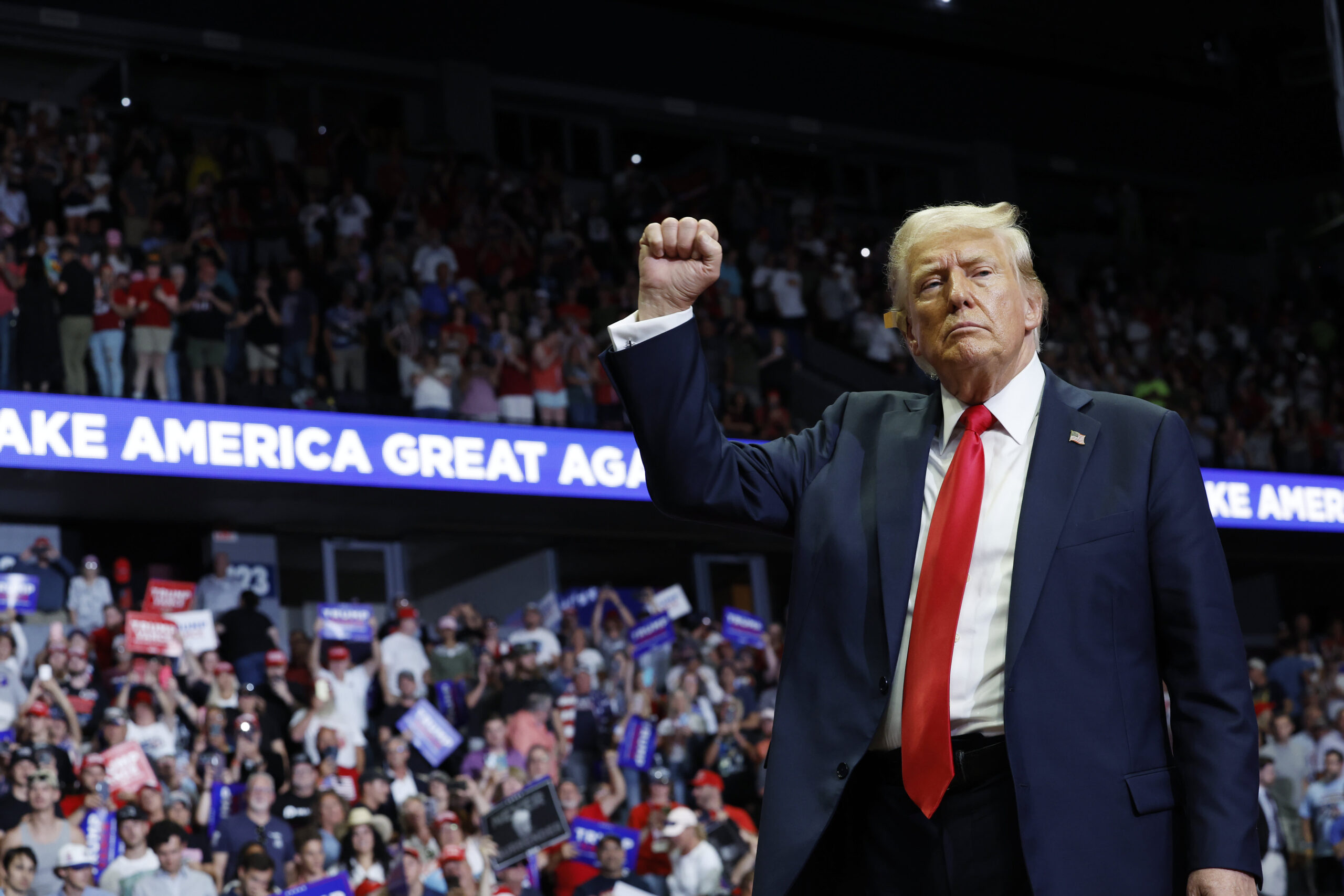Regulation
Trump Proposes Creating Strategic National Stockpile of Cryptocurrencies at Bitcoin Conference

Republican presidential candidate and former U.S. President Donald Trump leaves the stage after speaking at a campaign rally at Van Andel Arena in Grand Rapids, Michigan, July 20, 2024.
Anna Moneymaker | Getty Images
The former president’s remarks were made as the race to capture the votes and campaign money of early adopters of fintech in the United States takes center stage in the 2024 presidential race.
“This afternoon, I am laying out my plan to ensure that the United States will be the cryptocurrency capital of the planet and the global bitcoin superpower and we will get there,” Trump said.
But Trump’s promise to simply maintain the U.S. government’s current bitcoin holdings was a less radical proposal aimed at crypto advocates than other proposals presented at the conference.
Third party candidate Robert F. Kennedy Jr.For example, during his speech at the Bitcoin conference on Friday, Kennedy promised to launch a reserve of 4 million bitcoins, starting with bitcoin holdings that the U.S. government has already accumulated from criminal seizures. Kennedy said he would require the government to buy 550 bitcoins per day until the reserve reaches 4 million.
Shortly after Trump’s speech, Senator Cynthia Lummis, Republican of Wyoming, read her own legislative proposal to establish an official U.S. federal reserve of 1 million bitcoins over five years.
“It will be held for at least 20 years and can be used for one purpose only: to reduce our debt,” Lummis said.
Bitcoin’s price briefly dipped during Trump’s speech, but recovered and was up slightly for the day as of 5:15 p.m. ET.
Throughout his speech, the former president took pains to draw contrasts between the Republican Party’s growing adoption of cryptocurrency and the hardline regulatory approach that has characterized the Biden administration.
“The Biden-Harris administration’s crackdown on cryptocurrencies and bitcoin is wrong and it’s very bad for our country,” Trump said. “Let me tell you, if they win this election, every single one of you will be gone. They will be vicious. They will be ruthless. They will do things you wouldn’t imagine.”
Trump then listed a series of pro-cryptocurrency promises to a crowd of enthusiastic bitcoin supporters, vowing to dismantle what he called the “anti-cryptocurrency crusade” of President Joe Biden and Vice President Kamala Harris.
“On day one, I will fire Gary Gensler,” Trump said, referring to the Biden-appointed board chairman. Securities and Exchange Commission which has taken an aggressive approach to regulating cryptocurrencies.
The president does not have the power to remove appointed commissioners. Even if Trump were to appoint a new SEC chairman, Gensler would remain a commissioner at the independent agency.
The former president also pledged to create a “presidential advisory council on bitcoin and cryptocurrencies.”
“The rules will be written by people who love your industry, not by people who hate it,” Trump said.
The Republican presidential candidate also held a fundraiser in Nashville, with tickets peaking at $844,600In June, BTC Inc. CEO David Baileywhich organized the conference, has pledged to raise $100 million and mobilize more than 5,000,000 voters for Trump’s re-election effort, as the bitcoin industry increasingly turns to the Trump camp for support.
Trump’s takeover of the main stage to speak directly to the Bitcoin community is the latest in a months-long campaign to appeal to the crypto contingent, including accept donations in virtual tokenspledging to end President Joe Biden’s “war on crypto” and advocating that all future bitcoins will be made in AmericaIt is also a real turnaround on the part of the Republican presidential candidate.
Trump was publicly dismissed Bitcoin when he was in the White House. July 2019He said he was “not a fan” of bitcoin and other cryptocurrencies. He said the tokens are not money, that their value is “based on hot air,” and warned that unregulated crypto assets could facilitate drug trafficking, among other “illegal activities.”
“Bitcoin just looks like a scam,” he told Fox in a 2021 phone interview. “I don’t like it because it’s another currency that competes with the dollar.”
“I want the dollar to be the currency of the world, that’s what I’ve always said,” Trump continued in his conversation with Fox.
But five years later, a lost presidential election and millions of dollars from the crypto lobby, the Republican presidential candidate has sung the praises of digital currency. The largest Bitcoin conference of the year in Nashville, which began Thursday.
“Bitcoin represents freedom, sovereignty and independence from government coercion and control,” Trump said in his opening remarks.
Trump’s change of heart on bitcoin comes as the Republican Party vows to unravel the bureaucracy of the Biden-Harris administration, pushing to make cryptocurrency regulation a ballot issue for November, especially as inflation consistently ranks as a top priority for voters in polls.
As cryptocurrency lobbyists and advocates become increasingly present in Washington, it is questionable whether the Democratic Party will stick to the hard-line regulatory approach of recent years or soften its stance.
“Every presidential candidate needs to understand that voters who support digital assets and innovation are here to stay,” Democratic Rep. Wiley Nickel of North Carolina said in an interview with CNBC, adding that cryptocurrency regulation should not become a “partisan political issue.”
“I want this issue to remain a bipartisan issue. I don’t want Donald Trump to politicize this issue,” Rep. Nickel said.
Rep. Ro Khanna, D-Calif., echoed Rep. Nickel’s sentiment, saying that crypto should not become a partisan talking point, but will require regulation like any technology.
“I don’t really see why it’s partisan. Being against bitcoin is like being against cell phones. It’s like being against artificial intelligence. It’s like being against laptops,” Khanna told CNBC. “It’s a technology. There needs to be thoughtful regulation of it, but it’s a technology that’s gone from $10,000 to $80,000.”
Reps. Khanna and Nickel were two of the only Democrats to attend the Bitcoin conference.
Bitcoin Conference 2024 Organizers said they briefly discussed having Vice President Kamala Harris attend the conference, but she ultimately declined. But billionaire businessman Mark Cuban posted on X that Harris’ campaign had asked him about cryptocurrency. So it seems the vice president is studying this space and potentially figuring out where her policies, if elected president, might end up.
“I think we’re going to hear from Vice President Harris on this soon. And I’m very optimistic that we’re going to have a reset. And I think that’s going to be very important,” Rep. Nickel said. “This issue is not going to go away. And we need to make sure that we continue to address it in a bipartisan way.”
Harris’ team has already started reaching out to people close to cryptocurrency companies to set up meetings, the The Financial Times reported on Saturday.
Trump’s recent thaw in sentiment toward the digital asset sector has coincided with a sudden influx of interest and money from the country’s top tech talent.
It has raised more than $4 million in a mix of cryptocurrencies including bitcoin, ether, the U.S. dollar-pegged stablecoin USDC and various memecoins, with contributors hailing from 12 states, including a few battleground states.
Cryptocurrency billionaire twins and venture capitalists Tyler and Cameron Winklevoss led the charge, each contributing 15.57 bitcoins, or just over $1 million at the time of their donation, according to a filing with the Federal Election Commission — though they received a partial refund because the contributions exceeded the $844,600 limit.
There are a number of other venture capitalists who are pro-cryptocurrency and have also pledged millions to the Trump campaign.
Venture capitalists Marc Andreessen and Ben Horowitz told the employees Andreessen Horowitz (a16z) who plan to make large donations to political action committees supporting Trump’s campaign. Sequoia Capital partners are backing Trump, as is venture capitalist David Sackswho helped the former president raise $12 million at a fundraiser he hosted at his San Francisco home. The chief legal officers of the centralized cryptocurrency exchange Coinbase and blockchain giant Ripple were both there.
These members of the tech elite also contribute heavily to pro-crypto super PACs like Fairshake, which has raised over $200 million to elect pro-crypto candidates up and down the ballot, and on both sides of the aisle.
But according to NBC News reports The vice president’s team is looking to rally support from some swing donors at big tech companies, many of whom have been sidelined while President Joe Biden has remained in the race. Their pitch could change now that the vice president is the party’s de facto nominee.
Fortunately, Harris has a long history in California.
She has been fundraising in the tech community for years, including from those who work at Amazon, Alphabet, Microsoft And Apple.
“The turnaround that’s happened in the last three days is spectacular,” said Steve Westly, a venture capitalist and former California gubernatorial candidate. told NBC News“I don’t think I’ve ever seen such an outpouring of enthusiasm in any campaign I’ve been involved in.”
It comes as Trump’s vice presidential running mate, JD Vance, is scheduled to hold his own fundraiser in Palo Alto on Monday.
—CNBC’s Rebecca Picciotto contributed to this report.
Regulation
Crypto community gets involved in anti-government protests in Nigeria

Amid the #EndBadGovernanceInNigeria protests in Nigeria, a notable shift is occurring within the country’s cryptocurrency sector. As the general public demands sweeping governance reforms, crypto community leaders are seizing the opportunity to advocate for specific regulatory changes.
Rume Ophi, former secretary of the Blockchain Stakeholders Association of Nigeria (SiBAN), stressed the critical need to integrate crypto-focused demands into the broader agenda of the protests.
Ophi explained the dual benefit of such requirements, noting that proper regulation can spur substantial economic growth by attracting investors and creating job opportunities. Ophi noted, “Including calls for favorable crypto regulations is not just about the crypto community; it’s about leveraging these technologies to foster broader economic prosperity.”
Existing government efforts
In opposition to Ophi’s call for action, Chimezie Chuta, chair of the National Blockchain Policy Steering Committee, presents a different view. He pointed out The Nigerian government continued efforts to nurture the blockchain and cryptocurrency industries.
According to Chuta, the creation of a steering committee was essential to effectively address the needs of the crypto community.
Chuta also highlighted the creation of a subcommittee to harmonize regulations for virtual asset service providers (VASPs). With the aim of streamlining operations and providing clear regulatory direction, the initiative involves cooperation with major organizations including the Securities and Exchange Commission (SEC) and the Central Bank of Nigeria (CBN). “Our efforts should mitigate the need for protest as substantial progress is being made to address the needs of the crypto industry,” Chuta said.
A united call for support
The ongoing dialogue between the crypto community and government agencies reflects a complex landscape of negotiations and demands for progress.
While actors like Ophi are calling for more direct action and the inclusion of crypto demands in protest agendas, government figures like Chuta are advocating for recognition of the steps already taken.
As protests continue, the crypto community’s push for regulatory reform highlights a crucial aspect of Nigeria’s broader fight to improve governance and economic policies. Both sides agree that favorable regulations are critical to the successful adoption and implementation of blockchain technologies, signaling a potentially transformative era for Nigeria’s economic framework.
Read also : OKX Exchange Exits Nigerian Market Amid Regulatory Crackdown
Regulation
Cryptocurrency Regulations in Slovenia 2024

Slovenia, a small but highly developed European country with a population of 2.1 million, boasts a rich industrial history that has contributed greatly to its strong economy. As the most economically developed Slavic nation, Slovenia has grown steadily since adopting the euro in 2007. Its openness to innovation has been a key factor in its success in the industrial sector, making it a prime destination for cryptocurrency enthusiasts. Many believe that Slovenia is poised to become a powerful fintech hub in Europe. But does its current regulatory framework for cryptocurrencies support such aspirations?
Let’s explore Slovenia’s cryptocurrency regulations and see if they can propel the country to the forefront of the cryptocurrency landscape. My expectations are positive. What are yours? Before we answer, let’s dig a little deeper.
1. Cryptocurrency regulation in Slovenia: an overview
Slovenia is renowned for its innovation-friendly stance, providing a supportive environment for emerging technologies such as blockchain and cryptocurrencies. Under the Payment Services and Systems Act, cryptocurrencies are classified as virtual assets rather than financial or monetary instruments.
The regulation of the cryptocurrency sector in Slovenia is decentralized. Different authorities manage different aspects of the ecosystem. For example, the Bank of Slovenia and the Securities Market Agency oversee cryptocurrency transactions to ensure compliance with financial laws, including anti-money laundering (AML) and terrorist financing regulations. The Slovenian Act on the Prevention of Money Laundering and Terrorist Financing (ZPPDFT-2) incorporates the EU’s 5th Anti-Money Laundering Directive (5MLD) and aligns with the latest FATF recommendations. All virtual currency service providers must register with the Office of the Republic of Slovenia.
2. Cryptocurrency regulation in Slovenia: what’s new?
Several notable developments have taken place this year in the cryptocurrency sector in Slovenia:
July 25, 2024:Slovenia has issued a €30 million on-chain digital sovereign bond, the first of its kind in the EU, with a yield of 3.65%, maturing on 25 November 2024.
May 14, 2024:NiceHash has announced the first Slovenian Bitcoin-focused conference, NiceHashX, scheduled for November 8-9 in Maribor.
3. Explanation of the tax framework for cryptocurrencies in Slovenia
The Slovenian cryptocurrency tax framework provides clear guidelines for individuals and businesses. According to the Slovenian Financial Administration, the tax treatment depends on the status of the trader and the nature of the transaction.
- People:Income earned from cryptocurrencies through employment or ongoing business activities is subject to personal income tax. However, capital gains from transactions or market fluctuations are exempt from tax.
- Companies:Capital gains from cryptocurrency-related activities are subject to a 19% corporate tax. Value-added tax (VAT) generally applies at a rate of 22%, although cryptocurrency transactions that are considered as means of payment are exempt from VAT. Companies are not allowed to limit payment methods to cryptocurrencies alone. Tokens issued during ICOs must follow standard accounting rules and corporate tax law.
4. Cryptocurrency Mining in Slovenia: What You Need to Know
Cryptocurrency mining is not restricted in Slovenia, but income from mining is considered business income and is therefore taxable. This includes rewards from validating transactions and any additional income from mining operations. Both individuals and legal entities must comply with Slovenian tax regulations.
5. Timeline of the development of cryptocurrency regulation in Slovenia
Here is a timeline highlighting the evolution of cryptocurrency regulations in Slovenia:
- 2013:The Slovenian Financial Administration has issued guidelines stating that income from cryptocurrency transactions should be taxed.
- 2017:The Slovenian Financial Administration has provided more detailed guidelines on cryptocurrency taxation, depending on factors such as the status of the trader and the type of transaction.
- 2023:The EU adopted the Markets in Crypto-Assets (MiCA) Regulation, establishing a uniform regulatory framework for crypto-assets, their issuers and service providers across the EU.
Endnote
Slovenia’s approach to the cryptocurrency sector is commendable, reflecting its optimistic view of the future of cryptocurrencies. The country’s balanced regulatory framework supports cryptocurrency innovation while protecting users’ rights and preventing illegal activities. Recent developments demonstrate Slovenia’s commitment to continually improving its regulatory environment. Slovenia’s cryptocurrency regulatory framework sets a positive example for other nations navigating the evolving cryptocurrency landscape.
Read also : Hong Kong Cryptocurrency Regulations 2024
Regulation
A Blank Sheet for Cryptocurrencies: Kamala Harris’ Regulatory Opportunity

photo by Shubham Dhage on Unsplash
As the cryptocurrency landscape continues to evolve, the need for clear regulation has never been more pressing.
With Vice President Kamala Harris now leading the charge on digital asset regulation in the United States, this represents a unique opportunity to start fresh. This fresh start can foster innovation and protect consumers. It can also pave the way for widespread adoption across industries, including real estate agencies, healthcare providers, and online gaming platforms like these. online casinos ukAccording to experts at SafestCasinoSites, these platforms come with benefits such as bonus offers, a wide selection of games, and various payment methods. Ultimately, all this increase in adoption could propel the cryptocurrency market forward.
With this in mind, let’s look at the current state of cryptocurrency regulation in the United States, a complex and confusing landscape. Multiple agencies, including the Securities and Exchange Commission (SEC), the Commodity Futures Trading Commission (CFTC), and the Financial Crimes Enforcement Network (FinCEN), have overlapping jurisdictions, creating a fragmented regulatory environment. This lack of clarity has stifled innovation as companies are reluctant to invest in the United States, fearing regulatory repercussions. A coherent and clear regulatory framework is urgently needed to realize the full potential of cryptocurrencies in the United States.
While the US struggles to find its footing, other countries, such as Singapore and the UK, are actively looking into the cryptocurrency sector by adopting clear and supportive regulatory frameworks. This has led to a brain drain, with companies choosing to locate in more conducive environments.
Vice President Kamala Harris has a unique opportunity to change that narrative and start over. Regulation of cryptocurrencies. By taking a comprehensive and inclusive approach, it can help create a framework that balances consumer protection with innovation and growth. The time has come for clear and effective regulation of cryptocurrencies in the United States.
Effective regulation of digital assets is essential to foster a safe and innovative environment. The key principles guiding this regulation are clarity, innovation, global cooperation, consumer protection, and flexibility. Clear definitions and guidelines eliminate ambiguity while encouraging experimentation and development to ensure progress. Collaboration with international partners establishes consistent standards, preventing regulatory arbitrage. Strong safeguards protect consumers from fraud and market abuse, and adaptability allows for evolution in response to emerging trends and technologies, striking a balance between innovation and protection.
The benefits of effective cryptocurrency regulation are multiple and far-reaching. By establishing clear guidelines, governments can attract investors and mainstream users, driving growth and adoption. This can, in turn, position countries like the United States as global leaders in fintech and innovation. Strong safeguards will also increase consumer confidence in digital assets and related products, increasing economic activity.
A thriving crypto industry can contribute significantly to GDP and job creation, which has a positive impact on the overall economy. Furthermore, effective regulation has paved the way for the growth of many businesses such as tech startups, online casinos, and pharmaceutical companies, demonstrating that clear guidelines can open up new opportunities without stifling innovation. This is a great example of how regulation can allay fears of regressive policies, even if Kamala Harris does not repeal the current progressive approach. By adopting effective regulation, governments can create fertile ground for the crypto industry to thrive, thereby promoting progress and prosperity.
Regulation
South Korea Imposes New ‘Monitoring’ Fees on Cryptocurrency Exchanges

Big news! The latest regulatory changes in South Korea are expected to impact major cryptocurrency exchanges like Upbit and Bithumb. Under the updated regulations, these platforms will now have to pay monitoring fees, which could cause problems for some exchanges.
Overview of new fees
In the latest move to regulate cryptocurrencies, the Financial Services Commission announced on July 1 the revised “Enforcement Order of the Act on the Establishment of the Financial Services Commission, etc.” update “Regulations on the collection of contributions from financial institutions, etc.” According to local legislation newsThe regulations require virtual asset operators to pay supervisory fees for inspections conducted by the Financial Supervisory Service starting next year. The total fees for the four major exchanges are estimated at around 300 million won, or about $220,000.
Apportionment of costs
Upbit, which holds a dominant market share, is expected to bear more than 90% of the total fee, or about 272 million won ($199,592) based on its operating revenue. Bithumb will pay about 21.14 million won ($155,157), while Coinone and GOPAX will contribute about 6.03 million won ($4,422) and 830,000 won ($608), respectively. Korbit is excluded from this fee due to its lower operating revenue.
Impact on the industry
The supervision fee will function similarly to a quasi-tax for financial institutions subject to inspections by the Financial Supervisory Service. The new law requires any company with a turnover of 3 billion won or more to pay the fee.
In the past, fees for electronic financial companies and P2P investment firms were phased in over three years. However, the taxation of virtual asset operators has been accelerated, reflecting the rapid growth of the cryptocurrency market and increasing regulatory scrutiny.
Industry reactions
The rapid introduction of the fee was unexpected by some industry players, who had expected a delay. Financial Supervisory Service officials justified the decision by citing the creation of the body concerned and the costs already incurred.
While larger exchanges like Upbit and Bithumb can afford the cost, smaller exchanges like Coinone and GOPAX, which are currently operating at a loss, could face an additional financial burden. This is part of a broader trend of declining trading volumes for South Korean exchanges, which have seen a 30% drop since the new law went into effect.
-

 Regulation11 months ago
Regulation11 months agoRipple CTO and Cardano founder clash over XRP’s regulatory challenges ⋆ ZyCrypto
-

 Regulation9 months ago
Regulation9 months agoNancy Pelosi Considers Supporting Republican Crypto Bill FIT21 – London Business News
-

 Videos11 months ago
Videos11 months agoCryptocurrency News: Bitcoin, ETH ETF, AI Crypto Rally, AKT, TON & MORE!!
-

 Regulation11 months ago
Regulation11 months agoBitcoin’s future is ‘bleak’ and ripe for regulation, says lead developer
-

 News8 months ago
News8 months agoAave Price Increases Following Whales Accumulation and V3.1 Launch
-

 Regulation8 months ago
Regulation8 months agoSouth Korea Imposes New ‘Monitoring’ Fees on Cryptocurrency Exchanges
-

 Regulation8 months ago
Regulation8 months agoA Blank Sheet for Cryptocurrencies: Kamala Harris’ Regulatory Opportunity
-

 Regulation8 months ago
Regulation8 months agoCryptocurrency Regulations in Slovenia 2024
-

 News11 months ago
News11 months agoThe trader earned $46 million with PEPE after reaching a new ATH
-

 Regulation10 months ago
Regulation10 months agoCrypto needs regulation to thrive: Tyler Cowen
-

 Blockchain11 months ago
Blockchain11 months agoSolana ranks the fastest blockchain in the world, surpassing Ethereum, Polygon ⋆ ZyCrypto
-

 Blockchain10 months ago
Blockchain10 months agoSolana Surpasses Ethereum and Polygon as the Fastest Blockchain ⋆ ZyCrypto















